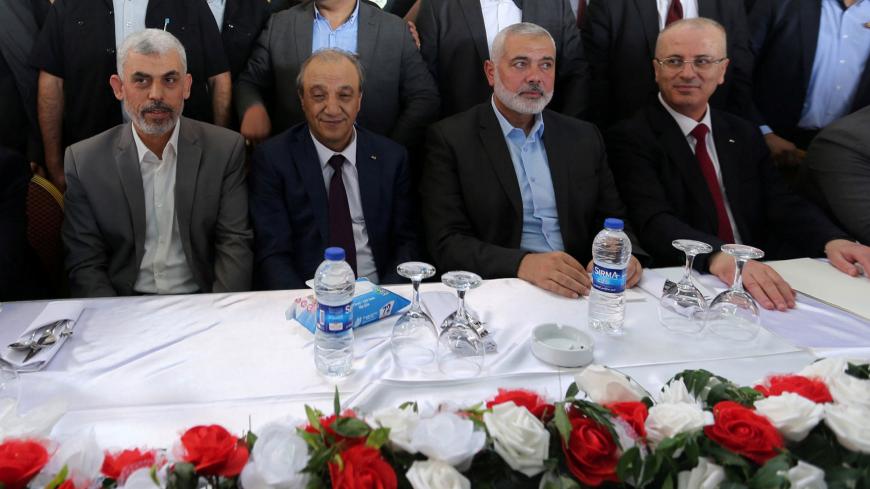The Palestinian reconciliation between Mahmoud Abbas, the president of the Palestinian Authority (PA), and Hamas has officially failed after Abbas accused the Islamist movement, in a speech at a Palestinian leadership gathering last month, of perpetrating the attack that targeted the motorcade of Palestinian Prime Minister Rami Hamdallah on March 13. The attack left seven security guards wounded, but Hamdallah escaped unharmed.
In the speech, Abbas addressed the reconciliation and said there had been “zero” progress in reconciliation due to Hamas, and he vowed to impose a fresh set of sanctions and end all aid payments to the Gaza Strip.
However, Abbas seems to be reluctant to impose fresh sanctions on the Gaza Strip in the midst of the Israeli attack on Gaza protesters that killed at least 17 and injured over 1,000. Egypt is trying to persuade him not to impose the new sanctions. So far, nothing is confirmed.
Hamas denied any involvement in the explosion that targeted Hamdallah. Hamas condemned in a press release what it termed the Palestinian president's baseless accusations, which it said “burns bridges and aggravates the division,” and called for general elections “so that the Palestinian people can choose their leadership.”
Hamas spokesman Fawzi Barhoum responded in a Facebook post, accusing PA officials of complicity in the attack against the prime minister.
An investigation by Hamas’ Interior Ministry found that a man named Anas Abu Khoussa was the prime orchestrator of the bombing. In an attempt to arrest the man, who was in hiding, a shootout broke out between Abu Khoussa, two accomplices and Hamas security forces that left Abu Khoussa killed along with one accomplice. Two Hamas security officers also died.
A Gaza Interior Ministry press conference March 28 said the investigation found that the perpetrators were a part of a Salafi cell. The investigation included video confessions of accomplices in the attack. PA officials, though, rejected the findings and said the whole investigation was a circus.
According to analysts, the reconciliation was already crumbling before this latest incident, but the incident officially terminated it and possibly terminated any hope for a future reconciliation. This comes as a disappointment to all the Palestinians who were hopeful, at least compared with previous rounds, that this round of talks would be the one to bear fruit.
This round of talks commenced on Sept. 17, when Hamas acquiesced to conditions set by Abbas to lift his sanctions and revive the reconciliation process: Hamas dissolved the administrative committee, a body in Gaza that was deemed by Abbas to be a parallel government; invited the consensus government to come to Gaza to assume its responsibilities and duties; and agreed to hold general elections in the near future. Abbas welcomed the decision by Hamas.
The reasons that led Hamas to comply with Abbas’ conditions at the time were believed to be a combination of three factors.
First was Egyptians’ arbitration efforts — which induced Hamas to take the abovementioned initiative.
The second was the new, more open-minded Hamas leadership led by Yahya Sinwar, who was upfront about Hamas' being a part of the problem and reportedly apologized on a number of occasions to Gaza’s young people for Hamas’ role in the division. Since the commencement of the new reconciliation round, Sinwar — Hamas' new head in Gaza — started cracking down on the self-interested and division-opposed Hamas members and was highly devoted to ensuring the success of the reconciliation to the point where he threatened to break the necks of those in Hamas who hamper the success of the reconciliation.
The third reason was the critically tough position that Abbas-imposed sanctions on Gaza put Hamas in. The PA president imposed those sanctions in June 2017 to force the Islamist movement to give up its control of the Gaza Strip. Those sanctions reportedly crippled the economy in just months, creating a sense of unique urgency within Hamas to comply to Abbas’ conditions.
Troubles emerged right after the Hamdallah government arrived in Gaza to assume its responsibilities after Hamas’ acquiescence. PA officials led by Azzam Al-Ahmad started to complain about the absence of a full enablement of the government in Gaza, allegations that Hamas denied.
According to three analysts Al-Monitor spoke with, after Hamas was successfully pressured to acquiesce to Abbas’ conditions, Abbas insatiably wanted more and wanted to twist Hamas’ arm more to the point where he asked Hamas to turn over its arms, which is deemed by Hamas as a red line.
At that time, Sinwar said at a gathering of Gazan youth on Dec. 20 that the national reconciliation was “falling apart” because “the concept of the reconciliation to some means terminating the resistance and turning over the arms and the tunnels.”
Sinwar added, “Hamas gave up control over all of the ministries and the crossings in Gaza, and we took tough and decisive measures to achieve the reconciliation” — to which Azzam Al-Ahmad responded in an interview with Baladna channel, “The percentage of the government enablement in Gaza is zero, and Hamas does not want the reconciliation."
Members of Hamas also complained in the midst of the talks that Abbas hasn’t lifted the sanctions as he promised if Hamas agreed to his conditions, to which PA officials said that they will be lifted after the "full enablement" of the government."
Both sides started throwing daily accusations at each other of being adamant for division and opposed to reconciliation. That led the public to begin seeing that this round of talks was no different that those in the past.
An anonymous source close to Hamas’ inner circle told Al-Monitor that the failure of the unity talks led to the following: The new, open-minded Hamas leadership started to lose confidence among Hamas’ ranks, and Sinwar has been labeled in the movement as the naive one who put too much trust in the PA. The source said this new Hamas leadership has seen its hold on power to start to slip, with hard-liners such as Mahmoud Al-Zahar and Fathi Hammad beginning to pick up the slack.
“The reconciliation talks had practically failed before the prime minister incident, but whatever scattered remnants of hopes there were for a reconciliation have been possibly irreversibly destroyed by the recent clash over the assassination attempt of the Palestinian prime minister. Now Hamas is going to be desperately seeking any alternative, and Abbas will strangulate Hamas and Gaza to the detonation point,” political analyst Muhammed Shehada told Al-Monitor.
On the point of Hamas’ seeking alternatives, Hamas is currently providing its full support to the Great Return March movement — the peaceful movement that calls for the right of return for Palestinian refugees and that mobilized on March 30 tens of thousands of refugees who participated in mass sit-ins near the borders and who were attacked by the Israeli army. The clashes resulted in the killing of at least 17 Palestinians and injury of over 1,400. Palestinians are expected to participate in more demonstrations April 6.
Shehada said that while the original organizers behind the demonstrations have been explicitly seeking the right of return for Palestinian refugees, Hamas’ leaders more practically want these popular protests to put pressure on Israel and Egypt to change the status quo in Gaza.
The reconciliation process has always been a baffling and a chaotic one, and the Palestinians generally do not know whom to blame. But the latest poll, which was conducted by the Ramallah-based Palestinian Center for Policy and Survey Research after the explosion that targeted the Palestinian prime minister's motorcade, showed 45% of people blaming the PA and Abbas for the failure of the reconciliation; 15% blame Hamas; and 27% do not know whom to blame.







